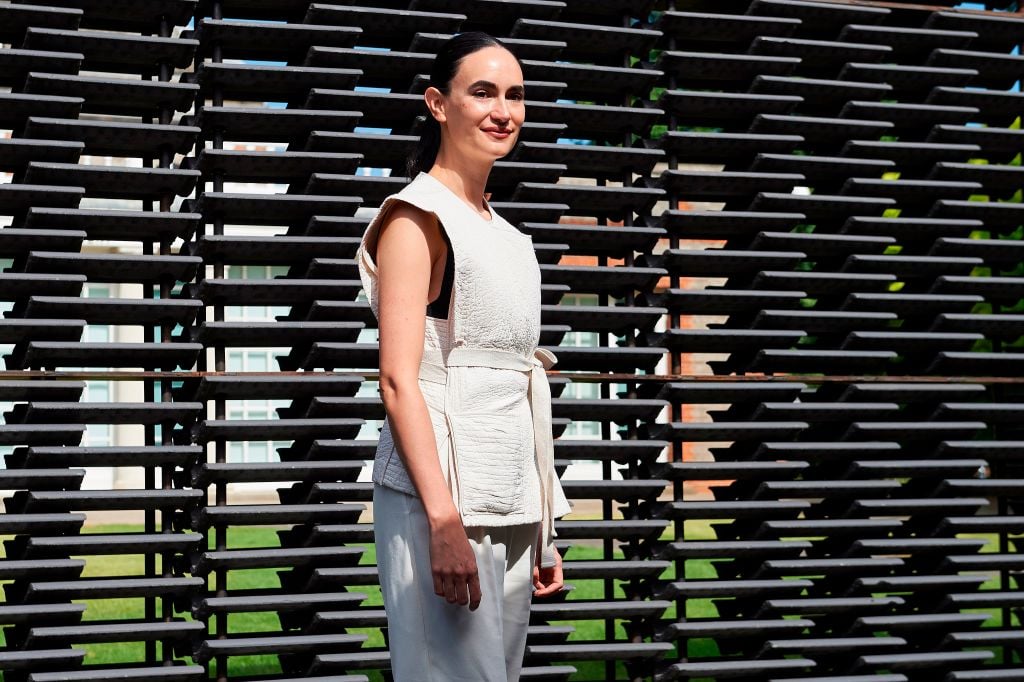
Mexican architect Frida Escobedo has been tapped to design the new Modern and contemporary art wing at the Metropolitan Museum of Art.
Escobedo, 42, will be tasked with adding an 80,000-square-foot extension to the museum’s Fifth Avenue building, a prestigious, $500 million project that has been in the works for years. She plans to emphasize “the interconnectedness of space and time and suggest a non-chronological narrative,” according to the museum’s announcement.
“The new wing will be a vibrant, exhilarating space that meets the Met’s current and future needs while promoting a lively representation and reevaluation of the art of the 20th and 21st centuries in the context of 5,000 years of art history,” said Met director Max Hollein in a statement.
He praised Escobedo as “an outstanding architect of our time,” saying that “she wields architecture as a way to create powerful spatial and communal experiences, and she has shown dexterity and sensitivity in her elegant use of material while bringing sincere attention to today’s socioeconomic and ecological issues.”
Escobedo was chosen from a shortlist of architectural firms that included Ensamble Studio, Lacaton and Vassal, SO — IL, and David Chipperfield Architects. “Already through her partnership,” Hollein said, “Frida has demonstrated her vision to create enthralling galleries that will challenge the embedded hierarchies of our history and chart a more accessible trajectory for the new wing.”
A pedestrian walks past the Metropolitan Museum of Art in New York, the United States, Aug. 18, 2020. Photo by Wang Ying/Xinhua via Getty images.
Updating the modern and contemporary galleries, the current iterations of which were inaugurated in 1987, has long been a priority for the museum. A $600 million addition intended to be completed in time for the Met’s 150th anniversary in 2020 was delayed in 2017. Then the Met suffered a $150 million shortfall during the pandemic, seemingly complicating renovation plans further (although president and C.E.O. Daniel Weiss said at the time that he was “not concerned” about finding the additional funding for the project).
But late last year, a transformative donation changed the equation for the museum. Financier Oscar L. Tang and his wife, Agnes Hsu-Tang, gave $125 million to the institution—the largest capital donation in its history—for the new wing.
Weiss told the New York Times this week that he expects the project to be completed in roughly seven years.
For Escobedo, the project represents the most notable commission of her young career. A graduate of Universidad Iberoamericana and the Harvard graduate school of design, she founded her eponymous studio in Mexico City in 2006. Those in the art world may know her best for her turn designing the 2018 Serpentine Pavilion in London—the youngest architect ever to be selected for the esteemed project—while other notable undertakings include an expansion of La Tallera Siqueiros in 2012, and renovations of the Hotel Boca Chica and El Eco Pavilion in 2008 and 2010, respectively.
With the new gig, she will become the first woman to design a wing at the Met.
“The Tang Wing presents an opportunity to give new life to the museum’s art from the 20th and 21st century; to celebrate the dynamics we can find within art of different times, geographies, and ideologies; and to uncover new spaces for self-reflection and connection with others,” Escobedo said in a statement.